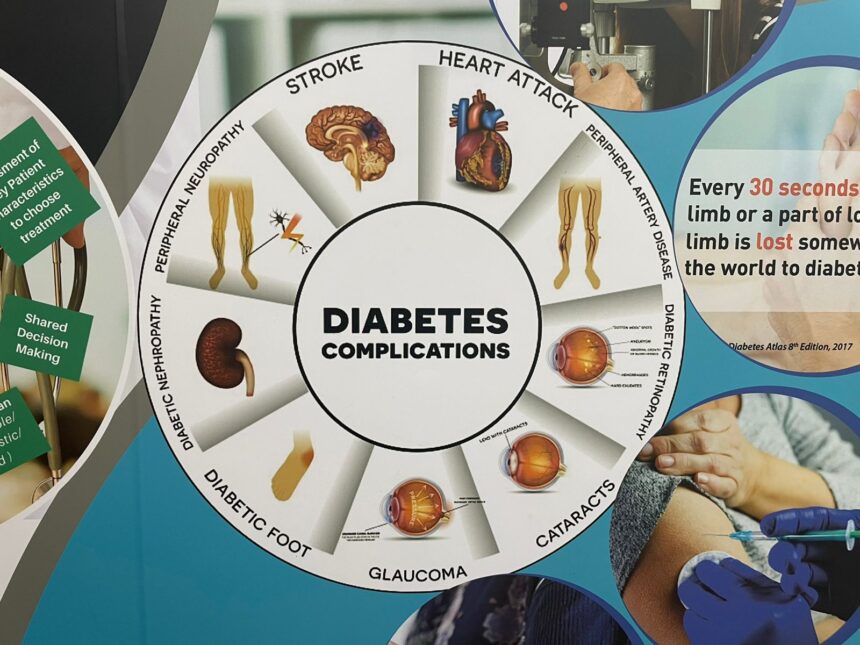Diabetes is a chronic health condition that affects how your body turns food into energy. Your body normally breaks down most of the food you eat into glucose and releases it into your bloodstream. When your blood sugar goes up, it signals your pancreas to release insulin, a hormone that lets blood sugar into your cells for use as energy. With diabetes, your body either doesn’t make enough insulin or can’t use the insulin it makes as well as it should. Here’s more information on diabetic health complications:
High Blood Glucose
High blood glucose, or hyperglycemia, is the hallmark of diabetes. It occurs when there is too much sugar in the blood. Type 1 diabetes is an autoimmune condition where the body’s immune system mistakenly attacks and destroys the insulin-producing cells in the pancreas. Type 2 diabetes develops when the body becomes resistant to insulin or doesn’t produce enough to maintain normal glucose levels.
Consistently high blood glucose damages various systems throughout the body over time, affecting nerves, blood vessels, and organs. The excess sugar in the bloodstream may lead to a range of complications, affecting both small and large blood vessels. Managing blood glucose levels is fundamental to preventing or delaying these outcomes. Some of the body systems affected by high blood glucose include:
- The Cardiovascular System: The heart and blood vessels.
- The Nervous System: The nerves.
- The Renal System: The kidneys.
- The Visual System: The eyes.
Insulin Resistance
Insulin resistance is a primary characteristic of Type 2 diabetes. In this state, cells in your muscles, fat, and liver don’t respond well to insulin and can’t easily take up glucose from your blood. As a result, your pancreas works harder to make more insulin to help glucose enter your cells.
As long as the pancreas produces enough insulin to overcome this resistance, blood sugar levels can stay in a healthy range. The pancreas may be unable to keep up over time, leading to elevated blood glucose levels and prediabetes or Type 2 diabetes. This ongoing strain on the body’s systems may contribute to the development of other health complications like obesity and heart disease.
Blood Circulation
Diabetes significantly impacts blood circulation because high blood glucose levels can damage blood vessels. High blood sugar levels can damage the lining of small and large blood vessels, causing them to narrow and harden. This condition, known as atherosclerosis, restricts blood flow to various parts of the body, including the heart, brain, legs, and feet. Poor circulation makes it harder for the body to heal, increases the risk of infection, and leads to more serious health problems.
Diabetic Ulcers
Poor circulation, combined with nerve damage (neuropathy) that can cause a loss of sensation, creates a high risk for developing diabetic foot ulcers. An ulcer is an open sore or wound that can occur from minor scrapes, cuts, or blisters that do not heal properly. Because of reduced blood flow and sensation, a person with diabetes might not notice a small injury on their foot. Without proper care, these ulcers can become infected and, in severe cases, may lead to amputation.
Long-Term Complications of Diabetes
Over many years, the cumulative effects of high blood glucose and poor circulation may lead to long-term complications. Chronic damage to blood vessels and nerves can result in serious conditions. These include an increased risk for heart attack and stroke, kidney disease (nephropathy) that may lead to kidney failure, and eye damage (retinopathy) that can cause vision loss or blindness. Consistent management of diabetes is fundamental for reducing the risk of these long-term issues.
Schedule an Appointment Today
If you’ve been diagnosed with diabetes or have concerns about your risk, it is key to seek professional medical guidance. Managing diabetes and its potential complications requires a proactive approach. Regular check-ups and a personalized management plan can help you monitor your health and address any issues as they arise. Schedule an appointment with a medical provider for more information and supportive management plans.









